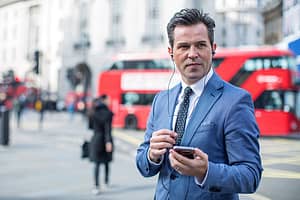Today, ODS , a Local Authority Trading Company (LATCO) owned by Oxford City Council, responsible for delivering frontline services, released guidelines on how to extend health & safety practices to ensure employee mental health is given an equal focus to physical wellbeing. While mental health awareness has been growing over recent years, the pandemic has put it sharply into focus for employers.
Anxiety, depression and other mental health problems are reportedly on the rise due to general fears and the unprecedented working conditions caused by COVID-19[1]. YouGov research has found that half of the key workers have experienced anxiety as a result of their work during the coronavirus crisis[2]. Over a third (37%) admitted to chronic sleeping problems, and a quarter ‘feel hopeless’.
The lockdown has put many into a situation where mental health can suffer due to a range of issues such as isolation, health anxieties, money worries and potential for resentment with some staff out on the frontline while others work from home or are on furlough, causing increased mental strain.
So how can companies care for mental health & safety during the pandemic and beyond? Here are a few tips from ODS:
- Keep communicating – Being seen to take care of your people is invaluable. Treating them as individuals and communicating clearly and empathetically is now an essential part of our day-to-day approach. We always did this, and now, we do it a lot more. We’ve learnt that offering bespoke guidance per team which is carefully communicated through dedicated managers is vital if operatives are to feel reassured about health and safety today. Communication must be ongoing and achievements recognised and applauded at this difficult time.
- Keep people connected – A lot of people may be feeling isolated as a result of working from home, being furloughed and having to social distance, especially those that live alone. There’s scope for non-work focused group activities which are helpful in forging a workplace community. This can be as simple as setting up a network on social media—for example, a Facebook page for employees to post about things that aren’t just work related. Other options can include events such as company-wide online quizzes to keep everyone engaged.
- Targeted guidance – Our big learning is that teams need bespoke guidelines and toolkits to carry out their unique day-to-day activities. So for refuse collection teams, these will operate in ‘bubbles’, have staggered start times, have breaks away from other colleagues and be regularly updated on the PPE equipment they need and the safety measures they must take.
- One-on-one conversations – While communal events can be entertaining and can gauge overall team morale, they don’t offer insight into how individuals are coping. This is why managers need to take the time to have regular one-on-one conversations with each member of staff to listen to any concerns or issues they may have. This is especially important with furloughed staff who may be feeling cut off from the rest of the company.
- Look after those most at risk – Not all jobs can be done from home, and some workers will have to be on-site during the pandemic. Having to be out on the ‘frontline’ is understandably a worry for these employees, and there is a possibility resentment could build as others can work safely at home. This is where physical and mental health & safety can work together. Ensuring they have all the necessary PPE will protect staff from the virus and take a weight off their mind. They also need to be listened to and any concerns they have should be addressed appropriately. A heartfelt, well-placed thank you can go a long way and prevent resentment. All of this should relieve any anxiety they have about safety and assuage any frustration they feel towards other colleagues.
Martin Shields, ODS’ Head of Safety, Health and Environment, comments, “Mental wellbeing is as important as physical wellbeing. Connecting with people remotely is always harder than within the workplace, so leaders have been putting aside time to focus on their people. With over 600 employees and a value proposition to do good, we can’t afford to be complacent about the health, safety and mental wellbeing of our employees.”
Director of People and Corporate Services, Anne-Marie Scott, adds, “A greater focus on communication of all types has helped us maintain morale and performance. This includes listening to what our people are telling us as well as keeping them updated on developments. Making sure everyone feels safe has been a constant focus as has looking at how we can re-tool what we do to ensure we meet our commitments to our customers while keeping our staff healthy. The innovations made now to working practices look set to lead to higher levels of employee engagement long term.”
She concludes, “Good safety is always good business, but neither is possible without outstanding communication.”






Leave a Comment